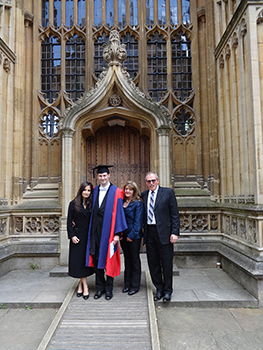Latest News Archive
Please select Category, Year, and then Month to display items
01 March 2023
|
Story Alicia Pienaar
 Prof Mathys Labuschagne is the Head of the Clinical Simulation and Skills Unit within the School of Biomedical Sciences in the Faculty of Health Sciences
Prof Mathys Labuschagne is the Head of the Clinical Simulation and Skills Unit within the School of Biomedical Sciences in the Faculty of Health Sciences
The Dean of the Faculty of Health Sciences, Prof Gert van Zyl, invites you to the inaugural lecture of Prof Mathys Labuschagne, Head of the Clinical Simulation and Skills Unit within the School of Biomedical Sciences in the Faculty of Health Sciences.
Subject: Clinical Simulation: Quo Vadis?
Venue: Auditorium, Equitas Building, Bloemfontein Campus
Date: 8 March 2023
Time: 17:30
RSVP on or before Friday 3 March 2023
Light refreshments will be served after the inaugural lecture.
About Prof M Labuschagne
Prof Mathys Labuschagne is the Head of the Clinical Simulation and Skills Unit within the School of Biomedical Sciences in the Faculty of Health Sciences at the University of the Free State. He completed his MB ChB degree and qualified as an ophthalmologist in 2006.
He developed an interest in health professions education and obtained a PhD in Health Professions Education in June 2012. The title of his thesis was: Clinical Simulation to enhance undergraduate medical education and training at the University of the Free State.
Prof Labuschagne was appointed Head of the Clinical Simulation and Skills Unit at the University of the Free State. The facility is utilised for undergraduate and postgraduate clinical simulation training, as well as interprofessional training and research. He has a special interest in simulation as training tool, precision skills training, and mastery of learning and simulation as tool to prepare students for interprofessional education and collaborative practice.
Prof Labuschagne is part of a multi-institutional consortium that developed the MySkills Medic app. It is a clinical procedural skills application aimed at graduating medical students, interns, and community-service doctors. He was appointed as a member of the Ophthalmology Foundation Education Simulation Subcommittee (affiliate of the International Council of Ophthalmology) tasked with developing a white paper to guide simulation training for ophthalmologists. He is involved in postgraduate supervision for master’s and PhD students in HPE.
UFS alumnus receives PhD in Statistics from the University of Oxford
2016-06-03

In May of this year, DW Bester obtained
a DPhil in Statistics at the University of
Oxford.
Photo: Supplied
On 14 May this year, Dr DW Bester received a DPhil in Statistics from the University of Oxford. The entire ceremony, which was held in the Sheldonian Theatre in Oxford, was conducted in Latin, as has been the case for the past 800 years.
Dr Bester completed his undergraduate studies and his honours degree at the University of the Free State (UFS). “At first, I was only planning to study for a master’s degree, but was privileged to get an opportunity to do a PhD as well. I didn’t think twice!” he says.
Studies at the University of Oxford
Universities in England do not require a master’s degree for PhD studies. With the help of Prof Max Finkelstein from the UFS Department of Mathematical Statistics and Actuarial Science, Dr Bester registered for the DPhil programme in Statistics directly after his honours studies.
“The title of my thesis was: Joint survival models: A Bayesian investigation of longitudinal volatility. It dealt with a problem in the medical field to determine the cause of stroke risk: is it the absolute level of blood pressure, or the volatility thereof? The analysis of this question led to interesting models which needed advanced application techniques. I had to study these techniques and write programmes for their application.
Although Dr Bester is working currently as the technical head of a company that calculates insurance for power stations, satellites, rockets, and cyber risks, he would like to continue working with his Oxford supervisor in future to make the techniques they have developed more accessible for researchers outside of the field of statistics.
“Studying at Oxford requires hard work, perseverance, and a lot of luck. Luck plays a big role, since there are no guarantees that hard work will ensure you a spot in one of the top universities.
Regarding his studies at Oxford, Dr Bester thinks back on his exposure to the GNU/Linux operating system, and free software. “I have seen how valuable this is for analyses in practice. I also had the privilege of meeting the father of free software, Richard Stallman,” Dr Bester says.
2011 Rhodes Scholar
He was elected as Rhodes Scholar in 2011. According to Dr Bester, who has been interested in Mathematics since high school, the Rhodes scholarship was something of a fluke. He applied for the Rhodes scholarship on the recommendation of Prof Robert Schall of the Department of Mathematical Statistics and Actuarial Science.
Role of the UFS in his successes
In addition to the continued support from the team of passionate professors and lecturers at the UFS, the actuarial degree at the UFS is fraught with statistics. Emphasis is also placed on Bayesian statistics. This was crucial to his studies at Oxford. According to Dr Bester, this topic is emphasised strongly in the international statistics community.
Dr Bester regards the work done by two of his lecturers, Michael von Maltitz and Sean van der Merwe, among his highlights at the UFS. Since our first year, they have created an atmosphere of camaraderie among the students. “I think this contributed to the success of everybody. They also make an effort to present topics outside of the syllabus regularly,” says Bester.